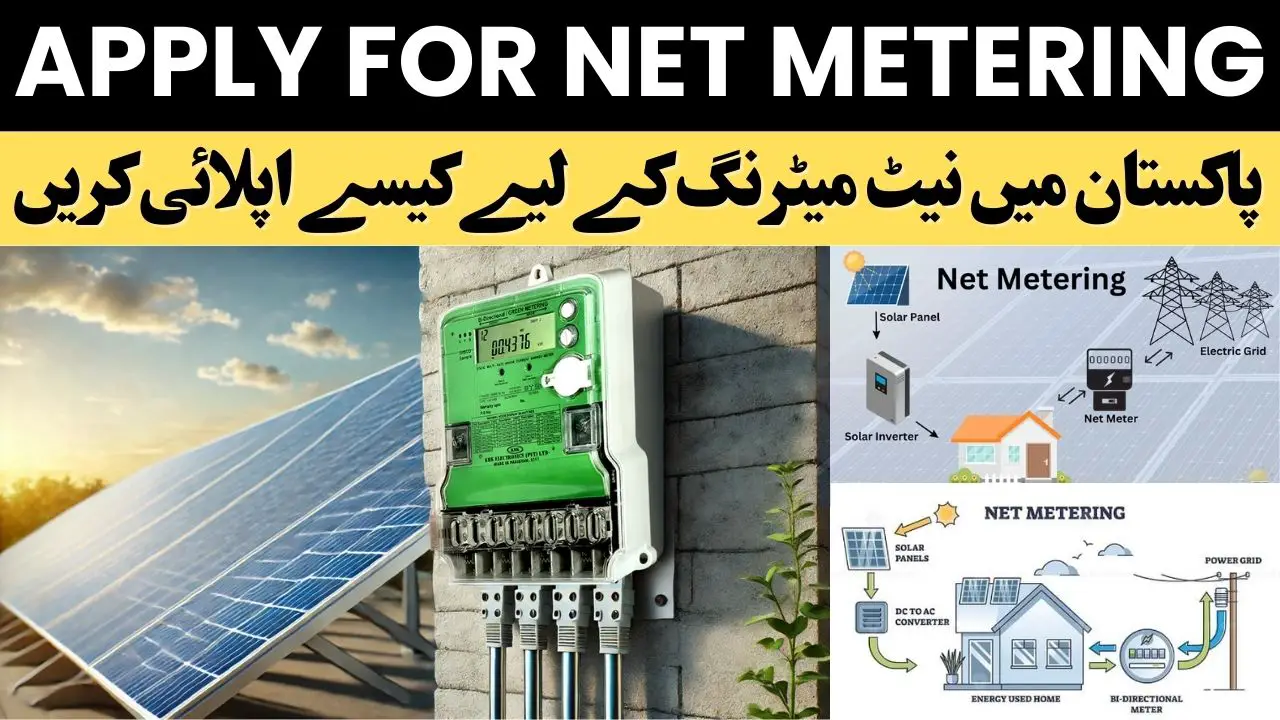Net metering in Pakistan allows consumers to sell excess electricity generated by their solar systems back to the national grid, reducing electricity bills and promoting renewable energy.
Contents
- 1 What is Net Metering in Pakistan?
- 2 Step-by-Step Net Metering Application Process
- 3 Eligibility Criteria for Net Metering
- 4 Net Metering Rates and Compensation
- 5 Net Metering Advantages and Disadvantages
- 6 Net Metering Estimated Costs
- 7 FAQs
- 7.1 What are the eligibility criteria for net metering in Pakistan?
- 7.2 How long does it take to get approval for net metering?
- 7.3 Can I install net metering with a single-phase meter?
- 7.4 What is the current tariff for net metering in Pakistan?
- 7.5 Can commercial and industrial users apply for net metering?
- 8 Conclusion
What is Net Metering in Pakistan?
Net metering is a billing mechanism that credits solar energy system owners for the electricity they add to the grid. Introduced by the National Electric Power Regulatory Authority (NEPRA) in 2015, net metering allows consumers with solar photovoltaic (PV) systems to sell surplus electricity back to the national grid. This system not only helps in reducing electricity bills but also promotes the use of renewable energy, contributing to environmental sustainability.
نیٹ میٹرنگ ایک بلنگ میکانزم ہے جو شمسی توانائی کے نظام کے مالکان کو اس بجلی کا کریڈٹ دیتا ہے جو وہ گرڈ میں شامل کرتے ہیں۔ نیشنل الیکٹرک پاور ریگولیٹری اتھارٹی (نیپرا) کی جانب سے 2015 میں متعارف کرایا گیا، نیٹ میٹرنگ سولر فوٹوولٹک (PV) سسٹم والے صارفین کو اضافی بجلی واپس قومی گرڈ کو فروخت کرنے کی اجازت دیتی ہے۔ یہ نظام نہ صرف بجلی کے بلوں کو کم کرنے میں مدد کرتا ہے بلکہ قابل تجدید توانائی کے استعمال کو بھی فروغ دیتا ہے، جس سے ماحولیاتی استحکام میں مدد ملتی ہے۔

Step-by-Step Net Metering Application Process
- Install a Solar System
- Install an on-grid or hybrid solar PV system with a three-phase meter connection on your rooftop .
- Choose an AEDB Registered Solar Company
- Contact an Alternative Energy Development Board (AEDB) registered solar company to handle the application process .
- Prepare Documentation
- Gather necessary documents such as your National ID card, latest electricity bill, and proof of ownership or a long-term lease agreement for the premises .
- Technical Evaluation and NOC Issuance
- The solar company submits your application to the relevant Distribution Company (DISCO), which conducts a technical evaluation. The Punjab Energy Department issues a No Objection Certificate (NOC) upon approval .
- Sign Agreement
- Sign an agreement with your local electricity provider, allowing you to export surplus solar energy to the national grid .
- Obtain Generation License
- Submit the signed agreement to the National Electric Power Regulatory Authority (NEPRA) to obtain a generation license, authorizing you to operate as an independent power producer for three years .
- Activate Net Metering
- After receiving the generation license, net metering services are activated, and a net meter is installed at your home, allowing you to sell electricity to the grid .
Eligibility Criteria for Net Metering
| Criterion | Details |
|---|---|
| Electricity Connection | Must have a valid and active electricity connection from DISCO . |
| Property Ownership | Own or have a long-term lease agreement for the premises . |
| Technical Standards | Solar system must meet NEPRA’s technical standards . |
| Certified Installation | System must be installed by a certified installer . |
| Agreement | Sign a net metering agreement with DISCO . |
Net Metering Rates and Compensation
| Item | Details |
|---|---|
| Tariff | Rs. 19.32/kWh as per NEPRA rules . |
| Billing Calculation | Based on net energy billing . |
| Credit Utilization | Surplus energy credits can offset future bills . |
Net Metering Advantages and Disadvantages
| Advantages | Disadvantages |
|---|---|
| Cost Savings: Offsets electricity bills significantly . | Intermittency: Solar production depends on sunlight . |
| ROI: Accelerates return on investment . | Regulatory Hurdles: Complex application process. |
| Environmental Impact: Reduces carbon emissions . | Initial Costs: High upfront installation costs . |
| Grid Stability: Enhances grid reliability. |
Net Metering Estimated Costs
| Item | Estimated Cost (PKR) |
|---|---|
| Solar System Installation | 150,000 – 300,000 (for a 1KW to 5KW system) |
| Application Fees | 10,000 – 20,000 |
| Technical Evaluation | Included in solar company services |
| Net Meter Installation | 20,000 – 30,000 |
| Total Estimated Expense | 180,000 – 350,000 |
FAQs
What are the eligibility criteria for net metering in Pakistan?
Must have a valid electricity connection, own the property, meet technical standards, have certified installation, and sign an agreement .
How long does it take to get approval for net metering?
The process usually takes 1.5 to 2 months from application to approval .
Can I install net metering with a single-phase meter?
Yes, net metering can be installed with a single-phase meter .
What is the current tariff for net metering in Pakistan?
Rs. 19.32/kWh as per NEPRA rules .
Can commercial and industrial users apply for net metering?
Yes, net metering is available for residential, commercial, and industrial users .
Conclusion
Net metering in Pakistan is an effective way to reduce electricity bills and contribute to a sustainable energy future. By following the outlined steps and collaborating with an AEDB-registered solar company, you can efficiently set up a net metering system and start benefiting from the program

